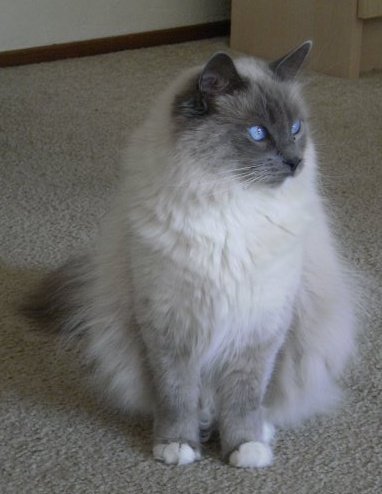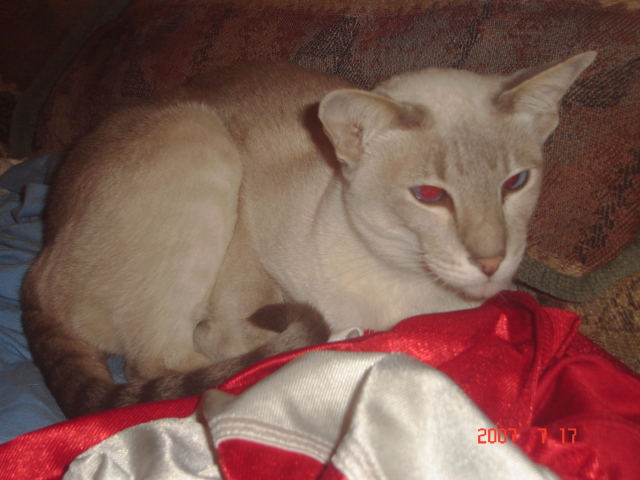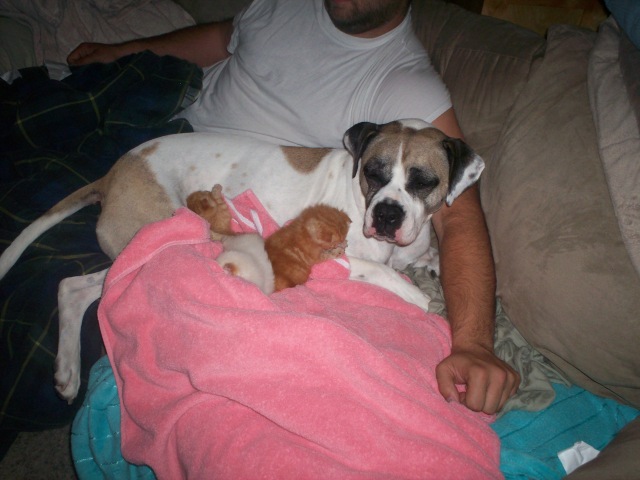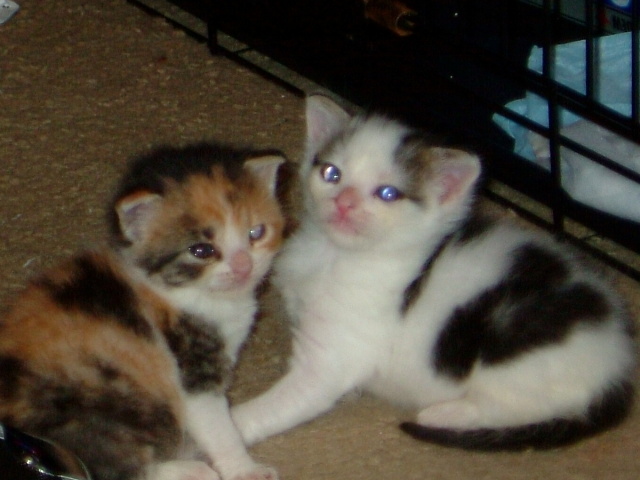QuestionHello Jessica,
My hubbie and I are proud owners of 3 previously stray/feral cats and so with the past years have gain a lot of knowledge on cat care but right now I would like to have a second opinion on this situation with a new cat. We have taken care of a young uneutered male lost/abandoned cat since last Spring 09 when he arrived at our door with a huge open infected wood all on the side of his neck/ear. Apart from that he was really in good shape %26 alert. I have carefully disinfected the wound morning/night everyday and fed him good vet food/natural holistic supplements to help him and after 2-3 weeks the wound was healed. Since then that big/long gorgeous 14 lbs semi-long black %26 burgundy haired boy (BeeCee his name) has been our official 'outdoor' cat/house guardian, always on post for food morning %26 evening everyday for the past 6 months. Now here in Eastern Quebec it is so harsh in winter #-25F these days# and at the first real snowstorm early Dec. we decided to bring him in the house in the guestroom. We had him for a week inside then had him neutered, vaccinated, dewormed #he had soft stool then and tested positive for it/vet could see worms in feces even#. Then he stayed at our place for 1 week in the same guestroom, The dewormer did good, his stools looked normal after couple of days. Then afterwards he stayed at my dad's for 2 weeks since we had a visitor for Xmas. The first couple days there his stools were soft but changed to normal afterwards #changing house again I suspect/nervous# and stayed that way. He has now been with us again officially since Monday, Jan. 4th and unfortunately his stools are soft and smelly again #never liquid diarrhea though# and has not really improved since then #now almost 2 weeks#. We have been giving the same food since last Spring #Hill's Vet T/D#, no new food added. I also noticed that he drinks a lot of water #calculated about 1 cup/day# and urinates a lot #I pick up about 5-6 urine - some big - clumps a day in his litter#. I called the vet office a couple times and one tech said it can take up to 1 week for the cat to settle in new home w/already many cats. The other tech the next day said for some cats it can take up to 2-3 weeks if they are *really* nervous.
I started 5 days ago dropping some lactose-free probiotic pill powder on his food. Now we started giving him HILL's vet I/D digestive food yesterday afternoon and I don't know how much time this could take to help him with the soft stool. This morning they were soft still. Now on some days I can see one darker normal piece of stool but beside it a clump of 'pudding'-like stool from same time going. He doesn't go "number2" often though, just once a day and on a few days, twice. Apart from the pee %26 poo issues, he is top shape, no vomiting, plays A LOT, doesn't meow when he goes to litter or it doesn't seem to be hurtful/difficult or anything for him and he mostly wants to come out of the bedroom and I understand poor guy. But we have an FIV-positive fellow in the house so we want to make sure our new cat is really OK before they have official contact, plus we *really* don't want to stress our FIV one. So we make it reaaally gradual, letting BeeCee out of the room once a day with the other cats in another closed part of house and vice-versa (no litters access to anyone then by precaution) so they can slowly get used to each other scents. We only let them smell each other through half-inch of the door from time to time.
Now I would HOPE that his stool issues end up being caused by stress. But I also spray FeliWay since couple of days in his room and outside to try to help. His stools have been checked again under microscope 2 days ago and they couldn't even find worm eggs floating, nothing at all in that big sample. They noticed though that there were some undigested T/D food bits in the sample (reason for changing T/D food to I/D). I also cleaned/changed the litter completely w bleach yesterday, since it was a month using now. Could another parasite not detectable under microscope at vet clinic be the problem ? They said that the dewormer given in Dec. is against 5 types of worms/parasites and is effective for 1 month. Or could it be that always being in a 12x14 bedroom, so obviously less exercise, no running really can cause digestive problems ?
As for the drinking of water and urinating more, could that be stress too ? Or maybe since the door of guestroom closed all the time and with a lot of winter heating, it's drier and makes him drink more ? We don't give him canned food, just one teaspoon every 2-3 days (E.Pack - Holistic Select), so his main food is only dry food. I do hope it's not diabetes or renal problems, though he looks really young for that (approx 2 years old with good young white teeth). From his weight and from I gather on many places on web, the amount of water he drinks seems to be normal, but the vet thinks it's not. I know our other cats never drink like that but then they get canned food portions twice a day.
Thanks so much for taking the time to read this,
Have a great day,
Val
AnswerHi Val. Thanks for taking in this guy!
I think you're okay with his water intake. Cats typically drink about 1 oz. of water per pound of body weight, so at 14 pounds, BeeCee could actually be drinking up to 2 cups of water per day without it being excessive. However, you are correct that excessive thirst and urination could indicate kidney failure or diabetes, so if money permits, it might be wise to have some blood tests run. If he had any pre-operative blood tests before his neuter, this may have screened for kidney failure. Blood glucose tests are quite inexpensive (about $15 in the US). If nothing else, it will give you great peace of mind if these tests come back normal.
As for his stool, it can take a couple of days before stomach upset will calm down on the i/d. However, it's possible he has a food intolerance and might do better on a low-allergen diet such as z/d. When a food intolerance or allergy is to blame, it can take up to 6 weeks on the new food before the inflammatory response calms down and you see improvement.
Do you know if his feces was examined only in the vet's office, or if it was sent out for testing? There are some protozoan parasites that can cause chronic soft stools, which often do not show up on fecal smears (viewing stool under a microscope). Coccidia and giardia can evade detection on regular fecal smears because they are so tiny. Giardia also encyst themselves, making detection difficult. Testing by a specialized laboratory is often required to catch these germs. The vet can treat these germs with antibiotics such as Albon for coccidiosis and Flagyl for giardiasis. Flagyl also has anti-inflammatory properties and both have some antibacterial properties. There is also a far less common protozoan parasite called tritrichomonas that may need to be considered if there is no response to these antibiotics. The test for tritrichomonas is rather expensive, however (about $160 US).
Some cats suffer from bouts of colitis or a condition called Inflammatory Bowel Disease. A corticosteroid such as prednisone can often help reduce the inflammation associated with these conditions. I have found that my own cats have responded better to doxycycline. This antibiotic has anti-inflammatory properties and inhibits the growth of bacteria. It's the choice of many vets to treat mild Inflammatory Bowel Disease that doesn't respond to Flagyl and can be used in place of or in conjunction with prednisone.
The kitty probably was a bit of a hunter outdoors, and surprisingly, going off of this raw whole prey can cause stomach upset in cats. Since canned food tends to resemble prey more than dry food (matches moisture content more closely, contains more meat and less vegetable matter), it might be good to feed him some canned i/d in addition to the dry. This could help him adjust to an all dry food diet.
It's true cats can take many weeks to grow accustomed to one another, and you are right to be very cautious when you have an FIV+ cat. I have two FIV+ cats myself, and I firmly believe that they are fine to live with other cats when they are in a peaceful household. A very slow introduction is essential to keeping things peaceful. So keep up the good work with the gradual introductions, and I think you will see some great results!
Best wishes!
Jessica

 Please help
Questionmy cat
QUESTION: Hi,
I have a Ragdoll ca
Please help
Questionmy cat
QUESTION: Hi,
I have a Ragdoll ca
 Siamese tracks feces around the house
Question
Dirty Foot
I recently adopted a wonderf
Siamese tracks feces around the house
Question
Dirty Foot
I recently adopted a wonderf
 My 12 year old indoor/outdoor male escaped 2 weeks after a recent move
QuestionEefa and our lost blac
QUESTION: We trie
My 12 year old indoor/outdoor male escaped 2 weeks after a recent move
QuestionEefa and our lost blac
QUESTION: We trie
 how long do I need to bottle feed?
Question
3 weeks old with their
4 weeks ago I was ridin
how long do I need to bottle feed?
Question
3 weeks old with their
4 weeks ago I was ridin
 2 Ferals
Question
Sister and Brother at
Hello!
Im so glad I fo
2 Ferals
Question
Sister and Brother at
Hello!
Im so glad I fo